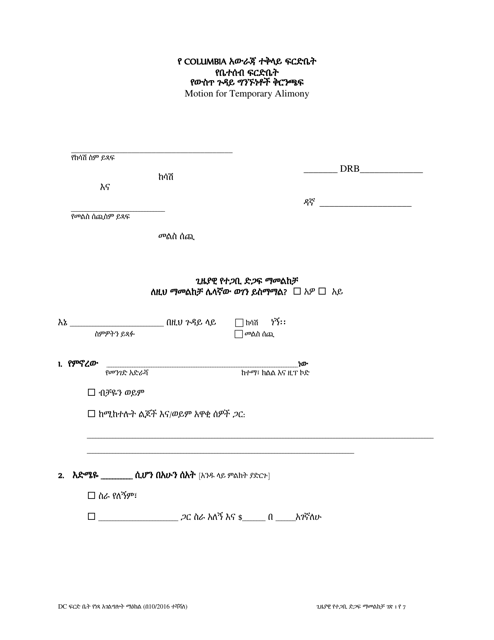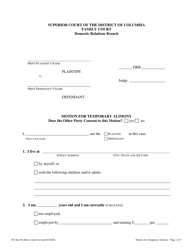Motion for Temporary Alimony - Washington, D.C. (Amharic)
This is a legal document that was released by the District of Columbia Courts - a government authority operating within Washington, D.C..
The document is provided in Amharic.
FAQ
Q: What is a motion for temporary alimony?
A: A motion for temporary alimony is a legal request asking the court to order one spouse to provide financial support to the other spouse during the divorce process.
Q: In which jurisdiction is this document used?
A: This document is used in Washington, D.C.
Q: What language is this document in?
A: This document is in Amharic, a language spoken in Ethiopia.
Q: What is the purpose of temporary alimony?
A: Temporary alimony is meant to provide financial support to the spouse in need until a final alimony decision is made by the court.
Q: Can temporary alimony be requested by either spouse?
A: Yes, either spouse can file a motion for temporary alimony.
Q: Is temporary alimony automatically granted?
A: No, temporary alimony is not automatically granted. The court will consider various factors before making a decision.
Q: What factors does the court consider when deciding on temporary alimony?
A: The court considers factors such as the needs of the requesting spouse, the ability of the other spouse to pay, and the standard of living during the marriage.
Q: Is temporary alimony the same as permanent alimony?
A: No, temporary alimony is not the same as permanent alimony. Temporary alimony is only granted during the divorce process, while permanent alimony may be awarded after the divorce is finalized.
Q: Can the amount of temporary alimony be modified?
A: Yes, the amount of temporary alimony can be modified if there is a significant change in circumstances.
Q: How long does temporary alimony last?
A: The duration of temporary alimony varies depending on the specific circumstances of the case. It may last until the divorce is finalized or until a final alimony decision is made by the court.
Form Details:
- Released on October 1, 2016;
- The latest edition currently provided by the District of Columbia Courts;
- Ready to use and print;
- Easy to customize;
- Compatible with most PDF-viewing applications;
Download a printable version of the form by clicking the link below or browse more documents and templates provided by the District of Columbia Courts.















